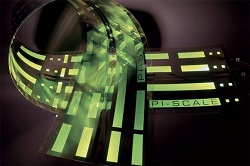Flexible OLEDs now one step closer to market
Along with PIX4LIFE and MIRPHAB, PI-SCALE is one of three projects aiming to help high-tech SMEs take photonics technologies from lab to market. The project, which is due for completion in December 2018, is key to realising European industry’s untapped potential on the flexible OLED market. High-tech SMEs in Europe are often cut off from access to the advanced, cost-intensive infrastructures and expertise needed to effectively test, scale up and commercialise their flexible OLED lighting or signage concepts. This world-leading, open access pilot line promises to help them achieve their goals. The project integrates existing European infrastructures and partners from the whole value chain. Together they aim to cover each of the four steps required to create advanced flexible OLED products: specialist high performance moisture barrier and electrode films, sheet-to-sheet and roll-to-roll flexible OLED fabrication, flexible device encapsulation, as well as lamination, bonding and system-level hybrid integration of thin film flexible electronics. The first demonstrator models were showcased at the IDW 23rd International Display Workshops taking place in Fukuoka, Japan from 7 to 9 December. They consist of long OLED stripes of up to 15 m with an efficiency of over 30 lm/W and nearly 100 % yield. The ones showcased at the event were produced using an R2R anode (roll to roll) deposition method, but S2S (sheet-to-sheet) process can be used as well. In total, the PI-SCALE project already deposited around 50 million OLEDs using the R2R process. Project partners intend to demonstrate the reliability and reproducibility of the pilot line by producing 15m-long OLEDs in R2R each month. Moreover, a monthly monitor batch of four 6in plates will be produced in S2S to demonstrate the operational capability of the pilot line’s production processes. The consortium already has big plans for converting its demonstrators into market applications. Audi, REHAU, emdedesign GmbH and Pilkington are already part of the list of PI-SCALE customers, and are planning to use the pilot line to develop flexible OLED lighting products their respective sectors. The consortium expects the pilot line to be ready to serve new customers in July 2017, with customised flexible OLEDs on thin-glass as well as on plastic foil produced in R2R and S2S. Interested companies are invited to reach out to the project. For more information please see: project website
Countries
Netherlands



